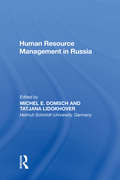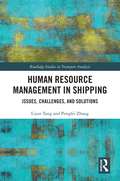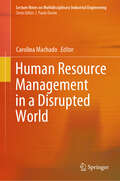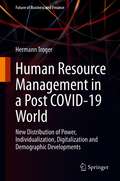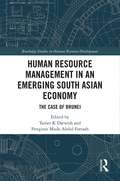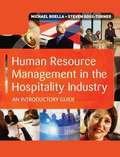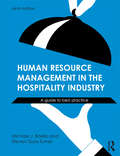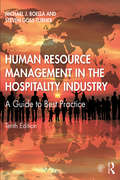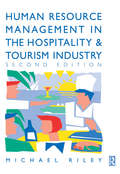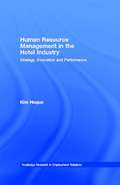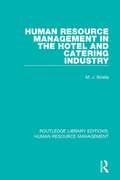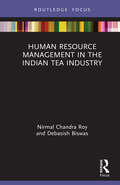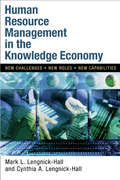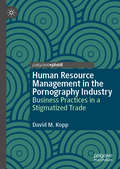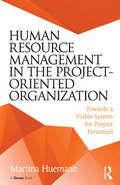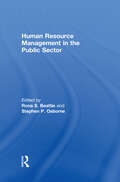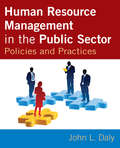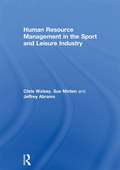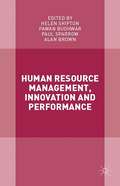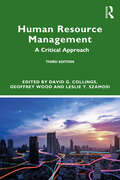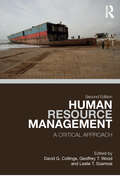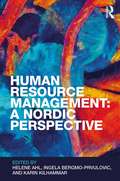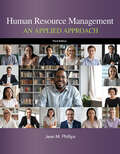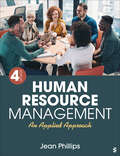- Table View
- List View
Human Resource Management in Russia (Contemporary Employment Relations Ser.)
by Michel E. Domsch Tatjana LidokhoverInvestigating Human Resource Management issues in Russia, this volume looks at the current state of Human Resource practice within Russian enterprises; its various problems and possible solutions. Following a detailed introduction into the current economic developments taking place in Russia, the book examines the new role of the HR department in Russian enterprises, and the influence of national politics on HR practice. The book also discusses key HRM issues such as recruitment and selection, training and development, payment and compensation, before surveying the various HR problems encountered by multinational companies working in Russia.
Human Resource Management in Shipping: Issues, Challenges, and Solutions (Routledge Studies in Transport Analysis)
by Pengfei Zhang Lijun TangThis book sheds light on the nature and causes of the issues and challenges in human resources in shipping and proposes fresh recommendations to manage them. It explains the multiple forces at play, including the global regulatory regime, national institutional frameworks, industrial practices, trade union responses, and pressures from customers and non-governmental organisations. Human Resource Management in Shipping integrates seafarer employment data released by national maritime authorities and a large body of literature that discusses discrete human resources issues in shipping into a single volume, providing readers with a comprehensive understanding of the issues and challenges within human resources in shipping. Beyond this, the book also offers a fresh perspective on some of the long lasting HRM challenges in the industry, such as skills shortage and seafarer recruitment and retention. This book aims to provide readers with systematic and in-depth knowledge of human resource management in shipping, and offers researchers a valuable source of reference and a solid foundation on which further development can be built.
Human Resource Management in a Disrupted World (Lecture Notes on Multidisciplinary Industrial Engineering)
by Carolina MachadoThis book presents a selection of the most insightful research shared at the XII International Conference on Intervention in Human Resources, themed &“HRM in a World in Disruption: At the Crossroads of People Management.&” It brings together studies that explore innovative strategies, challenges, and best practices in human resource management. Readers will find research-based discussions on how HR professionals and organizations are adapting to disruption, addressing workforce challenges, and implementing new management approaches. The book covers topics such as talent development, digital transformation in HR, leadership in uncertain times, and strategies for fostering resilience in organizations. Designed for academics, researchers, HR professionals, and students, this book provides valuable insights for those interested in the evolving landscape of human resource management.
Human Resource Management in a Post COVID-19 World: New Distribution of Power, Individualization, Digitalization and Demographic Developments (Future of Business and Finance)
by Hermann TrogerThis book presents a novel viewpoint in HR management: in addition to the macroeconomic factors (demographic development, industry 4.0, digitization, etc.) and its micro-political counterparts (shortage of skilled workers, an aging workforce, shortage of MINTs), personnel policy in the highly developed economic regions of the world can increasingly be seen from the third point of view, which is the ego-perspective. The complexity of the economic world 4.0 is manifesting itself for the employees in a working world of unlimited possibilities, offering almost limitless freedom of choice, especially for younger people. Due to this shift in the balance of power, the influence of the employers decreases and is often reduced to countering the pronounced self-confidence of the employees in asserting their expectations with corresponding company incentives. The author emphasizes that dealing with the challenges of this extremely fragile world of work - currently exacerbated by the COVID-19 pandemic - must by no means be left solely in the hands of overburdened personnel managers. The contribution of the line manager or direct superior is becoming increasingly important. And it is only through close and clearly defined cooperation between the two that the opportunity for effective human resources management lies. This book aims to illustrate this process of division of labor in the individual phases of personnel management.
Human Resource Management in an Emerging South Asian Economy: The Case of Brunei (Routledge Studies in Human Resource Development)
by Tamer K Darwish Pengiran Muda Abdul FattaahThis book focuses on human resource management (HRM) in the country context of Brunei Darussalam, analysing, comparing and contrasting domestic enterprises (DEs) with multinational enterprises (MNEs), and oil and gas with non-oil and -gas sectors, and draws out the comparative lessons for understanding the potential and performance consequences of HR interventions in resource-centred national economies. Work carried out more recently drawing a contrast between Asian capitalisms has established a number of important defining aspects inherent in economies in Asia; this helps to present approaches to establishing the way in which Brunei may be seen to be aligned with, and depart from, other business systems and frameworks in Asia. The existing literature highlights a trend towards focusing on the Asian context; however, most studies have focused on specific Asian countries, and research conducted in other contexts remains scarce. As the region gains economic prosperity, it is increasingly important to conduct some work that will be able to highlight the relevant HRM system(s) for other Asian contexts. Although some emerging Asian economies are still quite far from achieving developed nation status, it is however essential to understand the HRM systems prevalent in such economies as they can contribute greatly to the economic development there. Hence, this book highlights the importance of viewing the development and nature of HR in Brunei and locates the practice of HRM within the wider economic and political context, and draws out the theoretical and practical implications for understanding continuity in change in HR practice, and similarities with and differences from other emerging markets. It will be of interest to researchers, academics, and students in international and comparative human resource management.
Human Resource Management in the Hospitality Industry
by Michael Boella Steven Goss-TurnerNow in its eighth edition, Human Resource Management in the Hospitality Industry: an introductory guide, is fully updated with new legal information, data, statistics and examples, and includes brand new material on multi unit operations and management.Taking a 'process' approach, it guides the reader through every stage from HR planning through recruitment to termination/separation, covering the following issues:* Selection, appointment and induction* Training and management development* Labour turnover* Employee relations and employment law* Managing people and customer care* Business EthicsWritten in a user friendly style, each chapter includes international examples, bulleted lists, guides to further reading and exercises to test knowledge.
Human Resource Management in the Hospitality Industry: A Guide to Best Practice
by Michael Boella Steven Goss-TurnerNow in its ninth edition, Human Resource Management in the Hospitality Industry: A Guide to Best Practice, is fully updated with new legal information, data, statistics and examples. Taking a 'process' approach, it provides the reader with an essential understanding of the purpose, policies and processes concerned with managing an enterprise's workforce within the current business and social environment. Since the eighth edition of this book there have been many important developments in this field and this ninth edition has been completely revised and updated in the following ways: Extensively updated content to reflect recent issues and trends including: labour markets and industry structure, impacts of IT and social media, growth of international multi - unit brands, role of employer branding, talent management, equal opportunities and managing diversity. All explored specifically within the Hospitality Industry The text explores key issues and shows real life applications of HRM in the Hospitality industry and is informed through the authors' research projects within Mitchells & Butler's plc, Pizza Express, Marriott Hotels and Café Rouge. An extended case study drawing from the authors' experience working with Forte and Co., Centre hotels, Choice Hotels and Bass, Price Waterhouse and Grant Thornton Written in a user friendly style and with strong support from the Institute of Hospitality, each chapter includes international examples, bulleted lists, guides to further reading and exercises to test knowledge.
Human Resource Management in the Hospitality Industry: A Guide to Best Practice
by Steven Goss-Turner Michael J. BoellaHuman Resource Management in the Hospitality Industry: A Guide to Best Practice takes a ‘process’ approach and provides the reader with an essential understanding of the purpose, policies and processes concerned with managing an enterprise’s workforce within the current business and social environment. Since the ninth edition of this book there have been many significant developments in this field and this new edition has been completely revised and updated in the following ways: Extensively updated content to reflect recent issues and trends relevant to the hospitality industry including: changing labour market profiles and the ‘gig’ economy, the digital transformation of HRM practices, employer branding developments, talent management strategies, employee well-being considerations, and contemporary concerns over diversity, gender and harassment at work. Five new chapters on: organizational culture, modern labour markets, emotions and well-being, careers in hospitality, and digital HRM. New international case studies throughout to explore key issues and show real-life applications of HRM in the hospitality industry. Written in a user-friendly style, each chapter includes international examples, bulleted lists, guides to further reading and exercises to test knowledge.
Human Resource Management in the Hospitality and Tourism Industry
by Michael RileyThis fully updated and expanded second edition of Human Resource Management examines the role of human resource management in the hospitality and tourism industry. The subject is approached from four perspectives: * the social psychology of managing people * the economics of labour * the practical techniques * strategy. The author argues that labour costs, labour utilisation, labour market behaviour and pay are inseparable from the skills of managing people. The book contains an important analysis of the labour market for this industry and now, in its second edition includes, among others, chapters on attitude measurement, customer-employee relations, questionnaire design and organizational change. Human Resource Management in the Hospitality and Tourism Industry is written in a clear, user-friendly style and offers a challenging view of the subject and an opportunity to learn an important aspect of management in an applied context. It is appropriate for degree level students and practitioners in the industry.
Human Resource Management in the Hotel Industry: Strategy, Innovation and Performance (Routledge Research in Employment Relations #Vol. 2)
by Kim HoqueOver the last decade, human resource management has come to be viewed as the dominant paradigm within which analyses of the world of work have been located. This volume examines the nature and assesses the impact of HRM within a highly under-researched division of the service sector, namely the UK hotel industry. Common perceptions of management practices in the hotel industry typically include work intensification, high labour turnover, lack of training and poor career prospects, and casualised terms and conditions of employment. Using data from a survey of over 200 hotels, this book challenges such stereotypes by demonstrating that this part of the service sector is just as likely to have experimented with new approaches to HRM as the manufacturing industry. It suggests that primary influences on managerial decision-making in the hotel industry are no different from the primary influences affecting decision-making elsewhere, countering the argument that mainstream management theories are inapplicable within the hotel industry. Furthermore, where hotels emphasise the importance of service quality enhancement and where they introduce HRM as an integrated, mutually supporting package of practices, a strong relationship between HRM and organisational performance is proposed.
Human Resource Management in the Hotel and Catering Industry (Routledge Library Editions: Human Resource Management)
by M. J. BoellaThis book, first published in 1987, gives valuable insights into the characteristics of employment in the hotel and catering industry and useful guidance on personal techniques. It deals with fundamental issues, such as personnel policy, as well as with practical techniques. Human Resource Management in the Hotel and Catering Industry has been written as an introductory text to human resource management in the hospitality industry. It is suitable reading for students, line managers and personnel managers in the many different sectors of the business.
Human Resource Management in the Indian Tea Industry (Routledge Focus on Business and Management)
by Nirmal Chandra Roy Debasish BiswasLiberalization, Privatization and Globalization policy was advocated in India in 1991 under the supervision of P.V. Narasimha Rao, the then Prime Minister of India. As a consequence, the tea plantation industry was largely affected. It has confronted difficult competition because of the simplification of tariff barriers and the removal of the quantity restrictions on imports. The result of these on the share of export of Indian tea has declined, the price has plunged, and the profitability has reduced. To remain competitive in the market, tea-producing companies have been forced to reduce the various costs, especially labour costs. Due to this, tea companies are not in a position to fulfil their responsibilities such as health, safety, welfare, and working conditions to the workers. Besides, improper recruitment of labour, lack of proper training facilities, and even irregularities in payment of wages have been increased significantly. As a result, 1.2 million workers in the tea industry to sustain themselves and their families have been adversely affected. This leads to labour unrest and the industry has become vulnerable. The final impact of all these issues spreads to the quality of tea and profitability of the industry in India. This book examines the existing human resource management practices in the Indian tea industry. It adopts a simplified yet comprehensive approach to showcase workforce management in the tea industry. This book will be of value to postgraduate students, researchers, HR professionals, and policymakers in the fields of human resource management, business history, and industrial relations.
Human Resource Management in the Knowledge Economy: New Challenges, New Roles, New Capabilities
by Cyndy Lengnick-Hall Mark Lengnick-HallOffers a fundamentally new conceptual model for the human resource function to meet the challenges of the knowledge economy Provides concrete suggestions for implementing this model, including numerous examples of effective practices from leading-edge firms Synthesizes current thinking on knowledge management and intellectual capital and identifies how human resource management can make a value-added contribution As more organizations recognize the importance of intellectual capital and knowledge management to competitive success, you would expect human resources (HR) to move to the forefront of organizational leadership. Yet, to the contrary, HR continues to be criticized for its operational and bureaucratic focus and its inability to keep up with changes in the environment. Human Resource Management in the Knowledge Economy examines how human resource management must change if it is to remain a vital part of the organization. The Lengnick-Halls show how HR departments can move beyond a simple operational focus on attracting, selecting, developing, retaining, and using employees to a more strategic focus on managing human capital and managing knowledge. The book identifies the most important features of the knowledge economy and details four new roles HR must adopt in order to help organizations succeed in this new environment: human capital steward, knowledge facilitator, relationship builder, and rapid deployment specialist. Each of these roles is defined and described in detail using examples from leading-edge businesses. Human Resource Management in the Knowledge Economy describes how human resource management has evolved and continues to evolve to meet the increasing demands of organizations for sources of competitive advantage.
Human Resource Management in the Pornography Industry: Business Practices in a Stigmatized Trade
by David M. KoppWhile pornography is stigmatized as “dirty work," it faces many of the same operational considerations as traditional industries. From increasing competition, new technology that impacts services, to health and workplace safety issues, the pornography industry also utilizes and applies HRM strategies that include recruiting, selecting and retaining the best (sex) workers. As a follow up to his last book on the social history of training and development (2018), Kopp writes this final installment of a system contained within an unconventional setting as he reflects and distills the facets of human resource management found in the pornography industry. Specifically, this book explores traditional human resource management processes and practices, and examines how common HRM systems are contextualized in an “organization-as-pariah” venue. Topics covered include recruiting, career development, performance management and workforce diversity, offering readers a value-neutral, analytical assessment of the HR practices in the unconventional industry and stigmatized trade that is pornography.
Human Resource Management in the Project-Oriented Organization: Towards a Viable System for Project Personnel
by Martina HuemannOrganizations regularly assume that the culture, values, dynamic and organization of their temporary project organizations are merely a smaller version of the original parent. Given that project organizations are made up of people and teams drawn, in most cases, from outside and inside the parent, these assumptions are nonsensical. But they do explain why the HR function finds it difficult to adapt to the project environment. Martina Huemann's research in Human Resource Management in the Project-Oriented Organization, offers insight into an approach that is designed to align HR to the needs of the project organization, in terms of management structure, reward, recruitment and performance systems. The text analyses how the modern HR organization stacks up alongside the temporary organization that is the project, to identify the HR constraints and needs of the project organisation and offer a model of project-oriented HRM. Professor Huemann had a deep interest in how and why change processes come into existence and how to design and enable them. In her book she endeavors to bridge theory and practice, strategy and operations.
Human Resource Management in the Public Sector
by Rona S. Beattie and Stephen P. OsborneHRM is a core element in public service organizations, whose employees are often their most valuable resource. This outstanding book tackles the subject head on, bringing together cutting-edge research from a range of respected international authors.
Human Resource Management in the Public Sector: Policies and Practices
by John DalyThis affordable text covers the management of both human resource systems and employees in local government settings. It focuses on the significant changes facing local governments, especially the growing demand for increased Work-Life balance as an integral component of human resource management.
Human Resource Management in the Sport and Leisure Industry
by Sue Minten Chris Wolsey Jeffrey AbramsThe sport and leisure sectors possess unique characteristics that pose particular challenges for managers and human resource professionals. The age profile of workers, seasonality, the pressure to achieve short-term results, media intrusion, wide differences in pay between elite and community levels, and the importance of competition and consumer (fan) behaviour, all combine to set sport and leisure apart from 'mainstream’ business and management. Human Resource Management in the Sport and Leisure Industry is a comprehensive and accessible introduction to HRM in sport and leisure that examines these challenges in the context of organisational structure, systems, and individual and group behaviour, encouraging the reader to develop a strategic approach to HRM, and emphasising the importance of reflective professional practice. The book explores the full range of key issues, themes and concepts in contemporary HRM, including: the labour market in sport and leisure personal skills in HRM recruitment and selection learning, training and development evaluation and performance appraisal change management coaching and mentorship. Covering private, public and voluntary contexts, the book includes a wide range of examples and cases from the real world of sport and leisure management. Each chapter also includes highlighted definitions of key concepts, review questions, summaries and learning objectives, to guide student learning and help managers develop their professional skills. Effective human resource management and development is essential for business success, and this book is therefore important reading for any student or professional working in sport and leisure management.
Human Resource Management, Innovation and Performance
by Alan Brown Paul Sparrow Pawan Budhwar Helen ShiptonHuman Resource Management, Innovation and Performance investigates the relationship between HRM, innovation and performance. Taking a multi-level perspective the book reflects critically on contentious themes such as high performance work systems, organizational design options, cross-boundary working, leadership styles and learning at work.
Human Resource Management: A Critical Approach
by David G. Collings, Geoffrey Wood and Leslie T. SzamosiWritten by an international team of respected scholars, Human Resource Management: A Critical Approach, 3rd edition, adopts a critical perspective to examine the core management function of human resource management (HRM) in all its complexity – including its darker sides. Despite over three decades of debate around the nature of HRM, its intellectual boundaries and its application in practice, the field continues to be dogged by several theoretical and practical limitations. This textbook opens with a critique of the very concept of HRM, tracing its development over time, and then systematically analyses the context of HRM, practice of HRM and international perspectives on HRM.New chapters commissioned for this third edition examine HRM and consider issues including diversity and inclusion, employee well-being, digitalisation and AI, sustainable HRM and gig work and job deconstruction.This textbook is essential reading for advanced and inquisitive students of HRM, and for HRM professionals seeking to deepen their understanding of the complexities of their field.
Human Resource Management: A Critical Approach (Routledge Companions In Business, Management And Accounting Ser.)
by David G. Collings Geoffrey T. Wood Leslie T. SzamosiDespite over three decades of debate around the nature of human resource management (HRM), its intellectual boundaries and its application in practice, the field continues to be dogged by a number of theoretical and practical limitations. Written by an international team of respected scholars, this updated textbook adopts a critical perspective to examine the core management function of HRM in all its complexity – including its darker sides. Human Resource Management: A Critical Approach opens with a critique of the very concept of HRM, tracing its development over time, and then systematically analyses the context of HRM, practice of HRM and international perspectives on HRM. New chapters commissioned for this second edition look at HRM and the issues of diversity, migration, global supply chains and economic crisis. This textbook is essential reading for advanced and inquisitive students of HRM, and for HRM professionals looking to deepen their understanding of the complexities of their field.
Human Resource Management: A Nordic Perspective
by Helene Ahl Ingela Bergmo-Prvulovic Karin KilhammarSweden has one of the lowest national debts in Europe, a well-educated workforce, and the country consistently ranks in top positions of the best places to live and work in the world. Human Resource Management: A Nordic Perspective offers a unique and valuable insight into the working practices of HRM in Sweden, which has been explicated for an international audience. The book offers readers outside of the country alternative methods for improving efficiency and well-being in their own workplace. A team of experienced contributors based in Sweden discuss and analyse the Nordic tradition of inclusive and participative management and present different perspectives on creating a work-life suitable for every person involved. The first part of the book includes chapters on general issues in HR work such as development and learning, selection, teamwork, career paths, and cooperation within organisations. The second part addresses diversity, inclusion, and how discriminatory practices can be avoided. This book will be a valuable resource for students of: HRM, business, management, education, psychology, sociology, as well as human resource management professionals who are seeking new ways to balance economic and human values.
Human Resource Management: An Applied Approach
by Jean M. PhillipsFormerly published by Chicago Business Press, now published by Sage Human Resource Management: An Applied Approach prepares future HRM professionals to effectively utilize strategies and tools to advance their careers and support the growth and development of those they manage. Author Jean Phillips adopts an engage by example method, encouraging students to take action and create a lasting impact in the field of HRM that goes beyond theoretical learning. The Third Edition features new end-of-chapter exercises, company examples throughout the book, and a new section called Using This Knowledge at the end of each chapter, providing additional support for knowledge application. Through case studies, videos, and exercises, students will develop their personal skills and gain practical experience in applying various HR concepts, enabling them to become better managers and more effective leaders. This title is accompanied by a complete teaching and learning package. Contact your Sage representative to request a demo. Learning Platform / Courseware Sage Vantage is an intuitive learning platform that integrates quality Sage textbook content with assignable multimedia activities and auto-graded assessments to drive student engagement and ensure accountability. Unparalleled in its ease of use and built for dynamic teaching and learning, Vantage offers customizable LMS integration and best-in-class support. It′s a learning platform you, and your students, will actually love. Learn more. Assignable Video with Assessment Assignable video (available in Sage Vantage) is tied to learning objectives and curated exclusively for this text to bring concepts to life. Watch a sample video now. LMS Cartridge: Import this title′s instructor resources into your school’s learning management system (LMS) and save time. Don′t use an LMS? You can still access all of the same online resources for this title via the password-protected Instructor Resource Site. Learn more.
Human Resource Management: An Applied Approach
by Jean M. PhillipsFormerly published by Chicago Business Press, now published by Sage Human Resource Management: An Applied Approach prepares future HRM professionals to effectively utilize strategies and tools to advance their careers and support the growth and development of those they manage. Author Jean Phillips adopts an engage by example method, encouraging students to take action and create a lasting impact in the field of HRM that goes beyond theoretical learning. The Third Edition features new end-of-chapter exercises, company examples throughout the book, and a new section called Using This Knowledge at the end of each chapter, providing additional support for knowledge application. Through case studies, videos, and exercises, students will develop their personal skills and gain practical experience in applying various HR concepts, enabling them to become better managers and more effective leaders. This title is accompanied by a complete teaching and learning package. Contact your Sage representative to request a demo. Learning Platform / Courseware Sage Vantage is an intuitive learning platform that integrates quality Sage textbook content with assignable multimedia activities and auto-graded assessments to drive student engagement and ensure accountability. Unparalleled in its ease of use and built for dynamic teaching and learning, Vantage offers customizable LMS integration and best-in-class support. It′s a learning platform you, and your students, will actually love. Learn more. Assignable Video with Assessment Assignable video (available in Sage Vantage) is tied to learning objectives and curated exclusively for this text to bring concepts to life. Watch a sample video now. LMS Cartridge: Import this title′s instructor resources into your school’s learning management system (LMS) and save time. Don′t use an LMS? You can still access all of the same online resources for this title via the password-protected Instructor Resource Site. Learn more.
Human Resource Management: An Applied Approach
by Jean M. PhillipsFormerly published by Chicago Business Press, now published by Sage Focusing on knowledge acquisition and skill development, Human Resource Management: An Applied Approach is designed to prepare future managers and non-managers alike to effectively utilize human resource management strategies to advance their own careers while supporting the growth and development of those they manage. Author Jean Phillips adopts an applied approach, encouraging students to take action and create a lasting impact in the field of HRM that goes beyond theoretical learning. The Fourth Edition features new end-of-chapter exercises, company examples throughout the book, and a new section called Using This Knowledge at the end of each chapter, providing additional support for applying the topics covered. Through case studies, videos, and exercises, students will develop their personal skills and gain practical experience in applying various HR concepts, enabling them to become better managers and more effective leaders.
